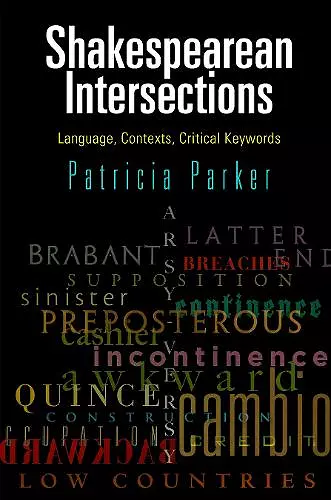Shakespearean Intersections
Language, Contexts, Critical Keywords
Format:Hardback
Publisher:University of Pennsylvania Press
Published:31st May '18
Currently unavailable, and unfortunately no date known when it will be back

Providing innovative and interdisciplinary perspectives on Shakespeare's plays, Patricia Parker offers a series of dazzling readings that demonstrate how easy-to-overlook textual or semantic details reverberate within and beyond the Shakespearean text, and suggest that the boundary between language and context is an incontinent divide.
What does the keyword "continence" in Love's Labor's Lost reveal about geopolitical boundaries and their breaching? What can we learn from the contemporary identification of the "quince" with weddings that is crucial for A Midsummer Night's Dream? How does the evocation of Spanish-occupied "Brabant" in Othello resonate with contemporary geopolitical contexts, wordplay on "Low Countries," and fears of sexual/territorial "occupation"? How does "supposes" connote not only sexual submission in The Taming of the Shrew but also the transvestite practice of boys playing women, and what does it mean for the dramatic recognition scene in Cymbeline?
With dazzling wit and erudition, Patricia Parker explores these and other critical keywords to reveal how they provide a lens for interpreting the language, contexts, and preoccupations of Shakespeare's plays. In doing so, she probes classical and historical sources, theatrical performance practices, geopolitical interrelations, hierarchies of race, gender, and class, and the multiple significances of "preposterousness," including reversals of high and low, male and female, Latinate and vulgar, "sinister" or backward writing, and latter ends both bodily and dramatic.
Providing innovative and interdisciplinary perspectives on Shakespeare, from early to late and across dramatic genres, Parker's deeply evocative readings demonstrate how easy-to-overlook textual or semantic details reverberate within and beyond the Shakespearean text, and suggest that the boundary between language and context is an incontinent divide.
"By honing a feminist philological practice attuned to the intersections of language, class, gender, sexuality, and race, Parker illuminates how single words and their discursive networks firm up or challenge hierarchies of self and other in early modern English culture....Working across historical periods, geographies, discourses, and languages, Parker traces how single words range far afield to mate, drawing other terms into the orbit of the self-same in subtle, queer, and preposterous ways. As one has come to expect from Parker, delight is in the details....Shakespearean Intersections delivers on the promises of philologically attuned intersectional analysis, revealing the critical, historical, ontological, and epistemological insights that arise when we delve deeply and patiently into the world of words." * Shakespeare Quarterly *
"The conclusion one draws from Shakespearean Intersections is that a lifetime of study in classical and early modern literature, multiple languages, philosophy, and world history might foster a critical perspective that invigorates our most familiar texts and makes them speak to the pressing issues of our time. This is the true promise of creative, inspiring literary criticism. It is a promise made good in Shakespearean Intersections." * Renaissance Quarterly *
"Parker has always been one of the most trenchant and dazzling observers of word behaviour and her command of the almost incorrigible and mischievous elements of Shakespeare's language is an art in itself. The vibrant way in which she conjures contexts and allusions, recalls, suppositions, bends, behinds and breaches draws out the spectacular ways in which meanings are networked across the plays, but also the audiences and how the word becomes a powerful token or gift through which we can explore the rich complexities of belonging to Shakespeare's play worlds." * Shakespeare Survey *
"Providing a rather prolific response to the age-old question, 'what's in a name?' this book's methodological approach to words (including nominal) as uniquely rewarding vehicles for exploring the language, contexts, and preoccupations of a period's literature and drama-together with oft-overlooked issues and historical intersections-testifies to the rich dividends paid by the meticulously close scholarly readings at which Parker is so adept." * Renaissance and Reformation *
"Shakespearean Intersections offers a stunningly creative and illuminating method for reading Shakespeare's words as nodes in densely linked webs of religious, racial, political, and sexual meanings. No word is safe from Patricia Parker's eagle-eyed attention to the polyglot resonances, inferences, and figurations that unexpectedly connect Shakespeare's language to contemporary discourses as diverse as sodomy, military science, biblical teleology, and orthography. Shakespearean Intersections shows us how much we have overlooked in Shakespeare's language, and how much richer and more inventive our readings of even his most familiar texts might be." * Mario DiGangi, The Graduate Center, City University of New York *
"Our editorial and critical endeavors have always (and perhaps necessarily) underestimated the activity of words-which is why we need Patricia Parker's extraordinary readings of Shakespeare." * Margreta de Grazia, University of Pennsylvania *
"In Shakespearean Intersections, Patricia Parker identifies a wide range of especially resonant keywords and cultural contexts for early modern drama. Her readings of Shakespearean drama are a joy to encounter: immensely learned; acutely sensitive to rhetorical complexity; and deeply thoughtful about the politics of language." * Patricia Cahill, Emory University *
ISBN: 9780812249743
Dimensions: unknown
Weight: unknown
424 pages